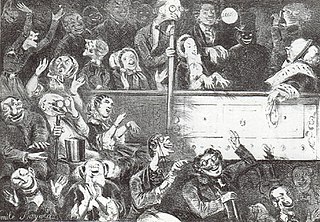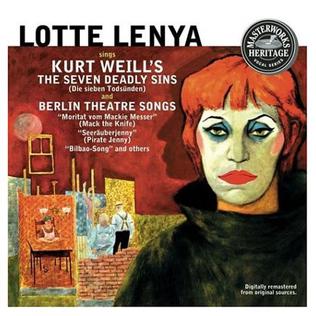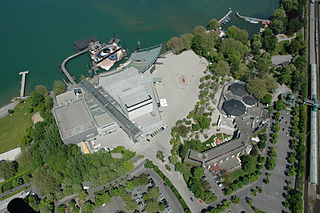
Operetta is a form of theatre and a genre of light opera. It includes spoken dialogue, songs, and dances. It is lighter than opera in terms of its music, orchestral size, length of the work, and at face value, subject matter. Apart from its shorter length, the operetta is usually of a light and amusing character. It sometimes also includes satirical commentaries.

Kurt Julian Weill was a German-born American composer active from the 1920s in his native country, and in his later years in the United States. He was a leading composer for the stage who was best known for his fruitful collaborations with Bertolt Brecht. With Brecht, he developed productions such as his best-known work, The Threepenny Opera, which included the ballad "Mack the Knife". Weill held the ideal of writing music that served a socially useful purpose, Gebrauchsmusik. He also wrote several works for the concert hall and a number of works on Jewish themes. He became a United States citizen in 1943.

Jacques Offenbach 20 June 1819 – 5 October 1880) was a German-born French composer, cellist and impresario. He is remembered for his nearly 100 operettas of the 1850s to the 1870s, and his uncompleted opera The Tales of Hoffmann. He was a powerful influence on later composers of the operetta genre, particularly Franz von Suppé, Johann Strauss Jr. and Arthur Sullivan. His best-known works were continually revived during the 20th century, and many of his operettas continue to be staged in the 21st. The Tales of Hoffmann remains part of the standard opera repertory.

Franz von Suppé, born Francesco Ezechiele Ermenegildo de Suppé was an Austrian composer of light operas and other theatre music. He came from the Kingdom of Dalmatia, Austro-Hungarian Empire. A composer and conductor of the Romantic period, he is notable for his four dozen operettas, including the first operetta to a German libretto. Some of them remain in the repertory, particularly in German-speaking countries, and he composed a substantial quantity of church music, but he is now chiefly known for his overtures, which remain popular in the concert hall and on record. Among the best-known are Poet and Peasant, Light Cavalry, Morning, Noon, and Night in Vienna and Pique Dame.

The Seven Deadly Sins is a satirical ballet chanté in seven scenes composed by Kurt Weill to a German libretto by Bertolt Brecht in 1933 under a commission from Boris Kochno and Edward James. It was translated into English by W. H. Auden and Chester Kallman and more recently by Michael Feingold. It was the last major collaboration between Weill and Brecht.

Sir David Willoughby Pountney is a British-Polish theatre and opera director and librettist internationally known for his productions of rarely performed operas and new productions of classic works. He has directed over ten world premières, including three by Sir Peter Maxwell Davies for whom he wrote the librettos of The Doctor of Myddfai, Mr Emmet Takes a Walk and Kommilitonen!

Der Zar lässt sich photographieren is an opera buffa in one act by Kurt Weill, op. 21. The German libretto was written by Georg Kaiser, and Weill composed the music in 1927. It is a Zeitoper, a genre of music theatre which used contemporary settings and characters, satiric plots which often include technology and machinery. Musically the Zeitoper genre tends to be eclectic and borrow from Jazz. The genre has practically disappeared from the world's opera houses. Historically the Zeitoper came to an abrupt end with the Nazi period, and after the war the cultural institutions were perhaps hesitant to return to the lighter, often decadent and comic operas written before the holocaust changed the artistic perspective. This conjecture is supported by the statistical fact that of all of Weill's, Schönberg's, Hindemith's and Krenek's works – it is these very shorter, satirical Zeitoper works that are no longer performed.

Der Silbersee: ein Wintermärchen is a 'play with music' in three acts by Kurt Weill to a German text by Georg Kaiser. The subtitle is an allusion to Heinrich Heine's 1844 satirical epic poem, Germany. A Winter's Tale.

Der Protagonist is an opera in one act by Kurt Weill, his Op. 15. The German libretto was written by Georg Kaiser based on his own play of the same name of (1920). Weill's first surviving opera has been described as Literaturoper.
Opera North is an opera company based at The Grand Theatre, Leeds, England. This article covers the period during which the Music Director has been Richard Farnes.

Bregenzer Festspiele is a performing arts festival which is held every July and August in Bregenz in Vorarlberg (Austria). It features a large floating stage which is situated on Lake Constance.

The WDR Rundfunkchor Köln is the choir of the German broadcaster Westdeutscher Rundfunk (WDR), based in Cologne. It was founded in 1947. The choir premiered works by contemporary composers including Arnold Schoenberg's unfinished opera Moses und Aron in 1954, Karlheinz Stockhausen's Momente, Luigi Nono's Il canto sospeso, Bernd Alois Zimmermann's Requiem für einen jungen Dichter and Penderecki's St Luke Passion.
Bertlies "Lys" Symonette was a German-American pianist, chorus singer and musical stage performer. In 1945 she took a job as rehearsal pianist, coach, understudy or multi-tasking "swing-girl" for The Firebrand of Florence, a Kurt Weill musical making its Broadway debut. This proved to be the start of a new career as Weill's musical assistant: from that point a principal focus of her professional life was on the composer and, more particularly after his early death in 1950, the career of his widow, the stage performer Lotte Lenya. When Lenya died, in 1981, Lys Symonette was appointed vice-president of the Kurt Weill Foundation, also serving as its "musical executive". When she died her friend and frequent collaborator, Prof. Kim H. Kowalke, published an affectionate tribute in which he described her as "the last and irreplaceable link to the inner artistic circle of Weill and Lenya".

Wolfgang Rennert was a German conductor. He focused on opera, at the Oper Frankfurt, Staatsoper Berlin, Mannheim National Theatre and the Semperoper, among others. He premiered operas, such as Louise Talma's Die Alkestiade in Frankfurt, and Rainer Kunad's Sabellicus in East Berlin. Regarded as a specialist in Mozart, Wagner and Strauss, he was a guest conductor at international opera houses including the Royal Opera House in London, the San Francisco Opera and the Dallas Opera.
Benno Paul Kusche was a German operatic baritone, who was praised as one of the best Mozart and Wagner singers, especially in character roles and opera buffa.

Marie Charlotte Cäcilie Geistinger (1836–1903) was an Austrian actress and operatic soprano, known as the "Queen of Operetta". She frequently appeared in works by Jacques Offenbach, Johann Strauss II and Franz von Suppé. She achieved particular acclaim for performing Rosalinda in the première of Die Fledermaus at the Theater an der Wien in 1874. In 1881, her debut at the Thalia Theatre in New York was well received.
Martin Achrainer is an Austrian operatic bass-baritone.
Olivier Tambosi is an Austrian opera and operetta director.
Robert Vambery was a theatre director, author and teacher, associated with the works of Kurt Weill.










